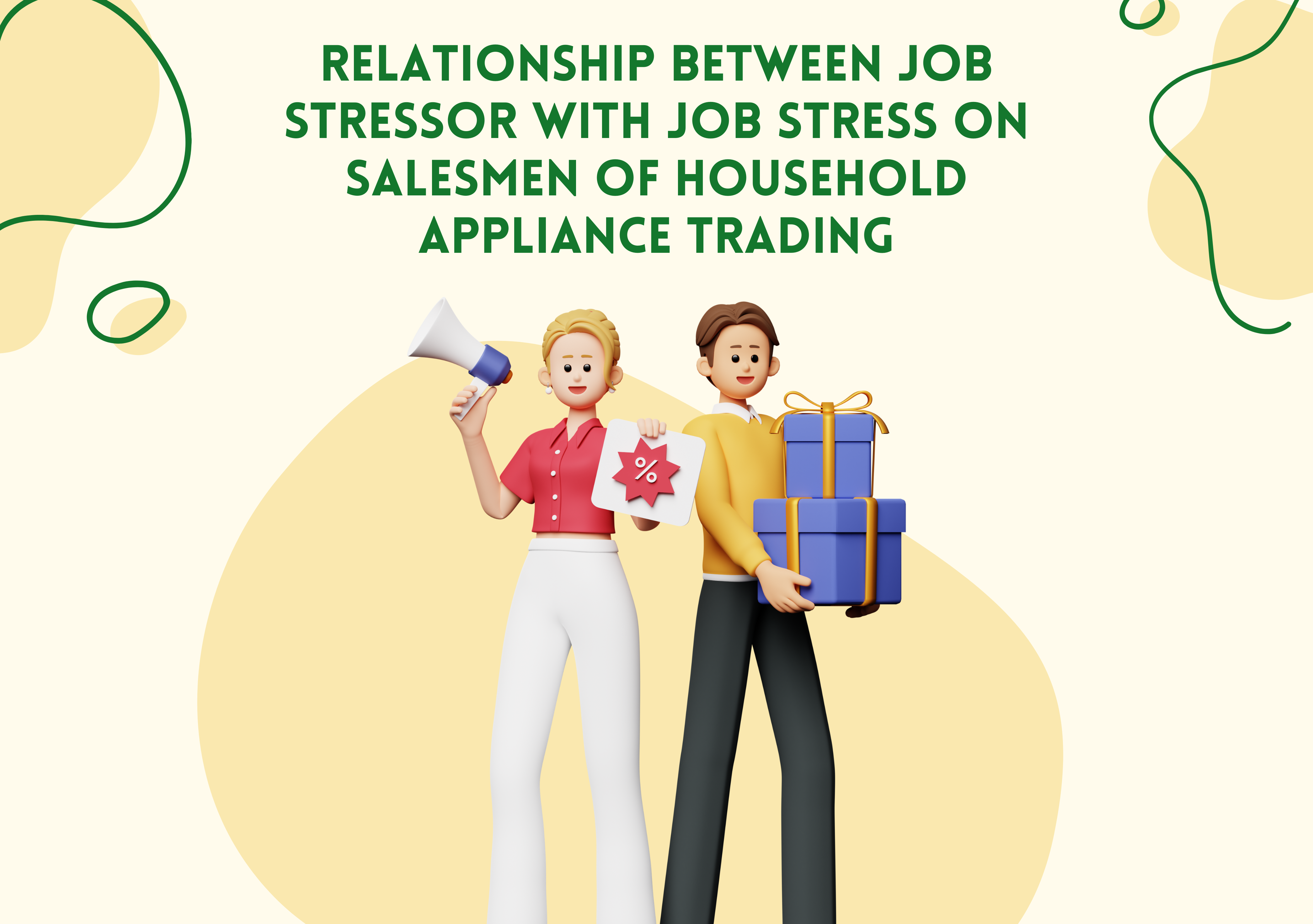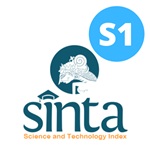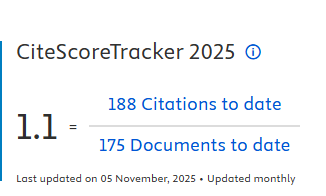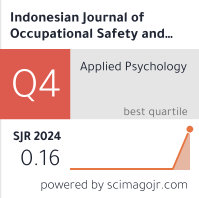Relationship Between Job Stressor with Job Stress on Salesmen of Household Appliance Trading

Downloads
Introduction: Salesmen's job is focused on promoting a product directly to consumers. Household appliances are one of the products that is often promoted by salesmen. While carrying out marketing activities, they will always be faced with various job factors that can cause job stress. This research was conducted to analyze the correlation between job stressors and job stress levels among salesmen. Method: This research was observational research with a cross-sectional approach. Both population and samples of this research were 30 salesmen of household appliance trading in Kediri City. The sampling technique used was total sampling. Variables used in this research were job stressor including role conflict, role ambiguity, interpersonal conflict, job uncertainty, total workload, and mental demands with job stress levels. Results: The results showed that most salesmen experienced job stressors either in high, moderate or low category. Most of the salesmen experienced normal job stress level. There is relationship between job stressors consisting of role conflict (0.673), role ambiguity (0.455), interpersonal conflict (0.262), job uncertainty (0.683), total workload (0.526) and mental demands (0.859) with job stress levels on salesmen. Conclusion: An increase in job stressor conditions experienced by salesmen will be followed by an increase in job stress levels, and vice versa. Out of all, mental demands have the strongest relationship to job stress levels on salesmen. So it is necessary to make efforts to suppress existing job stressors so that an increase of job stress levels on salesmen can be prevented.
Ansori, R. R. and Martiana, T. (2017) ‘Hubungan Faktor Karakteristik Individu dan Kondisi Pekerjaan Terhadap Stres Kerja pada Perawat Gigi', The Indonesian Journal of Public Health, 12(1), pp. 75–84.
Ardhian, W. et al. (2017) ‘Effect of Role Conflict and Role Overload to Burnout and Its Impact on Cyberloafing (Study on PT PLN (Persero) Pusat Manajemen Konstruksi)', Jurnal Bisnis STRATEGI, 26(2), pp. 89–99.
BPJS Ketenagakerjaan (2020) Laporan Tahunan Terintegrasi 2019. Jakarta: BPJS Ketenagakerjaan.
Bureau of Labor Statistics (2020) National Cencus of Fatal Occupational Injuries in 2019. Washington DC.
Chandra, R. and Adriansyah, D. (2017) ‘Pengaruh Beban Kerja dan Stres Kerja Terhadap Kinerja Karyawan Pada PT. Mega Auto Central Finance Cabang di Langsa', Jurnal Manajemen dan Keuangan, 6(1), pp. 670–678.
Chen, Y., Mccabe, B. and Hyatt, D. (2017) ‘Relationship between Individual Resilience, Interpersonal Conflicts at Work, and Safety Outcomes of Construction Workers', Journal Construction Engineering Management, 143(8), pp. 1–9.
Christy, N. A. and Amalia, S. (2017) ‘Pengaruh Stres Kerja Terhadap Kinerja Karyawan', Jurnal Riset Bisnis & Investasi, 3(2), pp. 74–83.
Crosswell, A. D. and Lockwood, K. G. (2020) ‘Best Practices for Stress Measurement : How to Measure Psychological Stress in Health Research', Health Psychology, 1(1), pp. 1–12.
Farid, M. M., Jayanti, S. and Ekawati (2019) ‘Hubungan Antara Stres Kerja dengan Kecelakaan Kerja Pada Pekerja Bagian Bekisting PT. Konstruksi X di Kota Semarang', Jurnal Kesehatan Masyarakat (e-journal), 7(4), pp. 331–335.
Febrianto, A., Romas, M. Z. and Harahap, D. H. (2018) ‘Hubungan Antara Stres Kerja dengan Prestasi Kerja Pada Tenaga Sales Motor Yamaha (Studi pada CV. Sumber Baru Niaga Yogyakarta)', Jurnal Psikologi, 14(1), pp. 33–41.
Gigol, T. and Sypniewska, B. A. (2019) ‘Interpersonal Conflicts in the Workplace and Authentic Leadership – Evidence from Poland', Journal of East European Management Studies, 1(Special Issue), pp. 37–62.
Guenzi, P. et al. (2019) ‘It Is All in Good Humor? Examining The Impact of Salesperson Evaluations of Leader Humor on Salesperson Job Satisfaction and Job Stress', Journal of Personal Selling and Sales Management. Routledge, 39(4), pp. 352–369.
Handoko, H. (2012) Manajemen Personalia & Sumber Daya Manusia. Yogyakarta: BPFE UGM.
Hurrell, J. J. and McLaney, M. (1988) ‘Exposure to Job Stress-A New Psychometric Instrument', Scandivanian Journal of Work Environment & Health, 14(1), pp. 27–28.
Inoue, A. et al. (2018) ‘Interaction Effect of Job Insecurity and Role Ambiguity on Psychological Distress in Japanese Employees : A Cross-sectional Study', International Archives of Occupational and Environmental Health. Springer Berlin Heidelberg, 91(4), pp. 391–402.
International Labour Organization (2013) Keselamatan dan Kesehatan Kerja Sarana untuk Produktivitas. Jakarta: International Labour Office.
International Labour Organization (2016) Workplace Stress: A Collective Challenge. Geneva: International Labour Office.
Juwita, K. and Arintika, D. (2018) ‘Impact of Role Conflict on Job Satisfaction, Mediatiang Job Stress in PT. Jombang Intermedia Press (Jawa Pos Radar Jombang)', Jurnal Konsep Bisnis dan Manajemen, 4(2), pp. 99–113.
Kamarulzaman K., Fatimah Z. and Nurulhuda M. H. (2018) ‘Role Conflict, Role Ambiguity and Job Stress Among Police Officers', International Journal of Academic Research in Business and Social Sciences, 8(8), pp. 844–855.
Kaswan (2017) Psikologi Industri dan Organisasi. Bandung: Alfabeta.
Kokoroko, E. and Sanda, M. A. (2019) ‘Effect of Workload on Job Stress of Ghanaian OPD Nurses: The Role of Coworker Support', Safety and Health at Work, 10(3), pp. 341–346.
Kraft, F. B., Maity, D. and Porter, S. (2019) ‘The salesperson wellness lifestyle, coping with stress and the reduction of turnover', Journal of Business and Industrial Marketing, 34(2), pp. 347–359.
Lady, L., Susihono, W. and Muslihati, A. (2017) ‘Analisis Tingkat Stres Kerja dan Faktor-Faktor Penyebab Stres Kerja pada Pegawai BPBD Kota Cilegon', Journal Industrial Services, 3(1b), pp. 191–197.
Lestari, N. K. A. and Utama, I. W. M. (2017) ‘Pengaruh Konflik Interpersonal dan Beban Kerja terhadap Stres Kerja Karyawan PT Pos Indonesia (Persero) Pusat Denpasar', E-Jurnal Manajemen Unud, 6(12), pp. 6357–6382.
McCormack, N. and Cotter, C. (2013) Managing Burnout in the Workplace. Oxford: Chandos Publishing.
Mulki, J. P. et al. (2015) ‘Regulation of Emotions, Interpersonal Conflict, and Job Performance for Sales People', Journal of Business Research, 68(3), pp. 623–630.
Murali, S. B., Basit, A. and Hassan, Z. (2017) ‘Impact of Job Stress on Employee Performance', International Journal of Accounting, Business & Management, 5(2), pp. 13–33.
Nappo, N. (2020) ‘Job Stress and Interpersonal Relationships Cross Country Evidence from the EU15: A Correlation Analysis', BMC Public Health, 20(1), pp. 1–11.
Nekoranec, J. and Kmosena, M. (2015) ‘Stress in the Workplace - Sources, Effects, and Coping Strategies', Review of the Air Force Academy, 28(1), pp. 163–170.
Ngirande, H. (2021) ‘Occupational Stress, Uncertainty and Organisational Commitment in Higher Education: Job Satisfaction as a Moderator', Sa Journal of Human Resources Management, 19, pp. 1376-1382.
Nova and Ispriyanti, D. (2012) ‘Analisis Tingkat Stress Wanita Karir dalam Peran Gandanya dengan Regresi Logistik Ordinal (Studi Kasus pada Tenaga Kerja Wanita di RS. Mardi Rahayu Kudus)', Media Statistika, 5(1), pp. 37–47.
Parvaiz, L. et al. (2015) ‘Impact of Stressor (Role Conflict, Role Overload, Leadership Support and Organizational Politics) on Job Stress and its Subsequent Impact on Turnover Intention', International Journal of Business and Management Invention, 4(10), pp. 52–63.
Pertiwi, E. M., Denny, H. M. and Widjasena, B. (2017) ‘Hubungan Antara Beban Kerja Mental dengan Stres Kerja Dosen di Suatu Fakultas', Jurnal Kesehatan Masyarakat (e-journal), 5(3), pp. 260–268.
Pratama, S. H. and Nugroho, S. (2015) ‘Analisis Faktor-faktor Pengaruh Stres Kerja Terhadap Karywan dengan Menggunakan Metode Structural Modelling (Studi Kasus Karyawan PT. Indofood CBP Sukses Makmur TBK. Divisi Noodle Cabang Semarang)', Industrial Engineering Online Journal, 4(1), pp. 1–18.
Ranihusna, D., Wulansari, N. A. and Asiari, D. K. (2020) ‘Role Conflict Relationships That Can Increase the Satisfaction of Hospital Nurses', in International Conference on Economics, Business and Economic Education, pp. 1231–1241.
Rosally, C. and Jogi, Y. (2015) ‘Pengaruh Konflik Peran, ketidakjelasan Peran, dan Komitmen Organisasi terhadap Kinerja Auditor', Business Accounting Review, 3(2), pp. 31–40.
Setiawan, M. R. (2019) ‘Analisis Faktor Resiko Stress Akibat Kerja Pada Pekerja Sektor Formal dan Sektor Informal di Kota Semarang', MEDICA ARTERIANA, 1(1), pp. 29–36.
Suci, I. S. M. (2018) ‘Analisis Hubungan Faktor Individu dan Beban Kerja Mental dengan Stres Kerja', The Indonesian Journal of Occupational Safety and Health, 7(2), pp. 220–229.
Sudiarditha, I. K. R., Mardi and Margaretha, L. (2019) ‘Study of Employee Performance : Workload On Job Satisfaction And Work Stress', Economics and Education Online Journal (ECONOSAINS), 17(1), pp. 31–45.
Sugiharto, F. M. (2019) ‘The Relationship between Mental Workload and Occupational Stress among Aircraft Maintenance Officers at PT X', The Indonesian Journal of Occupational Safety and Health, 8(2), pp. 233–239.
Suryani, N. K. and Yoga, G. A. D. M. (2018) ‘Konflik dan Stres Kerja dalam Organisasi', Jurnal Widya Manajemen, 1(1), pp. 99–113.
Susiarty, A., Suparman, L. and Suryatni, M. (2019) ‘The Effect of Workload and Work Environment on Job Stress and Its Impact on The Performance of Nurse Inpatient Rooms at Mataram City', Scientific Research Journal (SCIRJ), 7(6), pp. 32–40.
Tantra, S. and Larasati, T. (2015) ‘Faktor-Faktor Sosial yang Mempengaruhi Stres Kerja', Majority, 4(9), pp. 58–63.
The House of Representatives of The Republic Indonesia and The President of The Republic Indonesia (2003) Act of The Republic of Indonesia Number 13 Year 2003 Concerning Manpower.
Triyono, A. J. and Prayitno, A. (2017) ‘Pengaruh Konflik Peran dan Ambiguitas Peran Terhadap Stres Kerja dan Kinerja Pegawai Dinas Penerangan Jalan dan Pengelolaan Reklame Kota Semarang', Jurnal Penelitian Ekonomi dan Bisnis, 2(2), pp. 92–100.
Wicaksono, M. N. and Anggarini, I. M. (2019) ‘Faktor-Faktor yang Berhubungan dengan Stres Kerja Pada Pekerja Divisi Business Solution, Support dan Service Delivery PT Administrasi Medika Jakarta', Jurnal Ilmiah Kesehatan, 10(2), pp. 161–172.
Widyastuti, A. D. (2018) ‘Hubungan Stres Kerja Dengan Kelelahan Kerja Pada Pekerja Area Workshop Konstruksi Box Truck', The Indonesian Journal of Occupational Safety and Health, 6(2), pp. 216–224.
Workplace Health and Safety Queensland (2019) Preventing and Managing Risks to Work-related Psychological Health Workplace Health and Safety Queensland. Queensland: The Queensland Government.
Yasa, I. W. M. (2017) ‘Pengaruh Konflik Peran dan Ambiguitas Peran Terhadap Kinerja Pegawai Melalui Mediasi Stres Kerja pada Dinas Kesehatan Kota Denpasar Bali', JAGADHITA: Jurnal Ekonomi dan Bisnis, 4(1), pp. 38–57.
Zahra, A. A. and Hidayat, S. (2015) ‘Gambaran Tingkat Stress Kerja Antar Shift Kerja pada Petugas Pengumpul Tol Surabaya', The Indonesian Journal of Occupational Safety and Health, 4(2), pp. 123–133.
Copyright (c) 2023 The Indonesian Journal Of Occupational Safety and Health

This work is licensed under a Creative Commons Attribution-NonCommercial-ShareAlike 4.0 International License.

In order to be accepted and published by The Indonesian Journal of Occupational Safety and Health, Author(s) who submit an article should complete all the review process. The copyright of received articles assigned to the The Indonesian Journal of Occupational Safety and Health and Department of Safety and Health, Universitas Airlangga as publishers of the journal. The intended copyright includes the rights to publish articles in various forms (including reprints).
The Editorial Team of The Indonesian Journal Of Occupational Safety and Health and Department of Safety and Health strive to ensure that no errors occur in the articles that have been published, both data errors and statements in the article.
Users of this website will be licensed to use materials from this website following the Creative Commons Attribution-NonCommercial-ShareAlike 4.0 International License. No fees charged. Please use the materials accordingly.
------------------------------------------------------------------------------------------------------------------------------------------------------------------------------------------
Attribution ” You must give appropriate credit, provide a link to the license, and indicate if changes were made. You may do so in any reasonable manner, but not in any way that suggests the licensor endorses you or your use.
NonCommercial ” You may not use the material for commercial purposes.
ShareAlike ” If you remix, transform, or build upon the material, you must distribute your contributions under the same license as the original.







 How to Submit Articles in OJS
How to Submit Articles in OJS

























